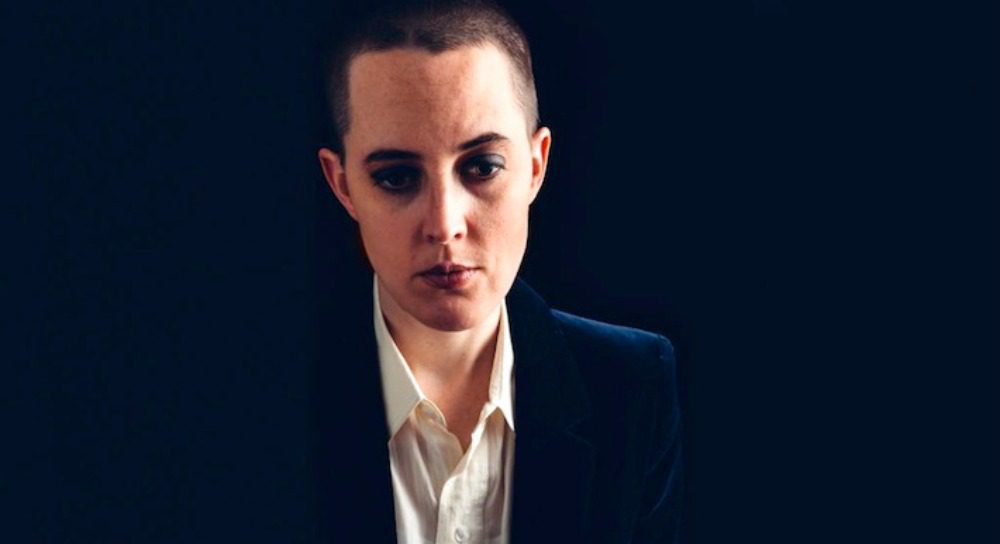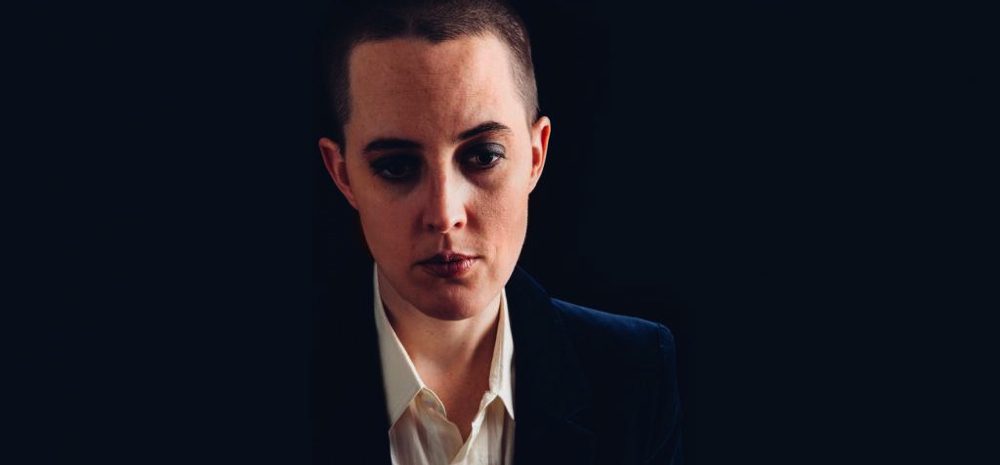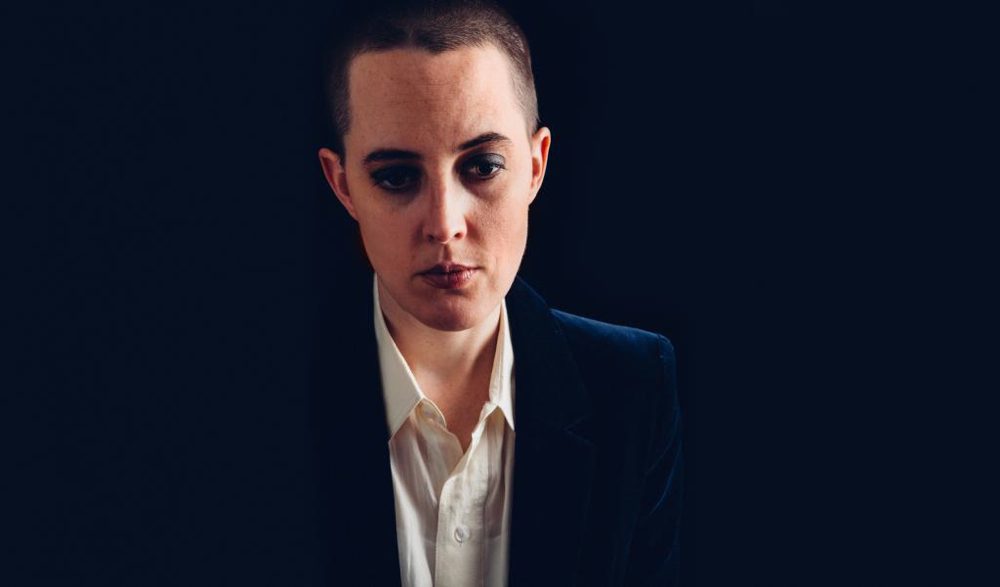
[fusion_builder_container hundred_percent=”yes” overflow=”visible”][fusion_builder_row][fusion_builder_column type=”1_1″ background_position=”left top” background_color=”” border_size=”” border_color=”” border_style=”solid” spacing=”yes” background_image=”” background_repeat=”no-repeat” padding=”” margin_top=”0px” margin_bottom=”0px” class=”” id=”” animation_type=”” animation_speed=”0.3″ animation_direction=”left” hide_on_mobile=”no” center_content=”no” min_height=”none”]
When you’re talking to Jana Hunter, nothing is taboo. As his band Lower Dens has gotten big, he’s used his platform to talk candidly about societal problems, like racism in the music industry and the enforcement of the gender binary, as well as internal struggles, like the temptation of infidelity. The characters in his songs are intentionally genderless, and his latest song “Real Thing” is about a woman who wants to “get out and get it on” while she’s married.
Lower Dens have toured with Explosions in the Sky and opened for Yo La Tengo and Beach House, and they performed at the Day for Night festival in December. The day after their show outside an abandoned post office in Houston, I talked to Hunter about why internalized misogyny is so rampant, how white people screw up by pretending they’re not racist, and how he knows Trump’s a psychopath but Lyndon Johnson wasn’t. (The genderfluid singer/songwriter/musician goes by both pronouns but asked that I use male ones to balance things out, since people use female ones by default.) The interview has been condensed and lightly edited for clarity.
Suzannah Weiss for Audiofemme: I really like your new song “Real Thing.” What inspired you to write that?
Jana Hunter: I really wanted to write a song with an old friend of mine from Houston. He and I had been kind of sharing music with each other for a long time and had never written a song together, so we decided to. One time, when I was back in town, he had a bunch of old porn magazines laying around his house, including a couple of Oui magazine, I was trying to find lyrics, and I looked in one of those and found an advice column. And a woman had written in asking for guidance about how to respectfully step out on her husband, basically. So that’s what the song came from. I really identified with that struggle to be a good person in the face of the desires that are inherent in being an animal with compulsions.
Why did you think that was an important thing to sing about?
Because it’s something that dominates so much of our lives. That’s basically the story of every human. We are animals with really profound, compelling instincts, trying to pretend that we are some kind of super beings that have everything figured out and in control. It’s the struggle at the center of everyone’s life, and that’s a pretty good example of it. We force ourselves into very strict monogamous relationship social structures. We enforce all sorts of rules that don’t take into account our compulsions, our desires, our needs. It’s the beauty and tragedy of all kinds of people’s lives, so you could write a million songs about all different aspects of it.
What would you write if you were the one answering her letter?
You have to talk to your partner and see if you can resolve your desires with one another, and if they’re irresolvable, you have to figure out what to do about that. The thing that you can’t do is act on your compulsions without any accountability to anyone else. That’s where all kinds of conflicts come in. People ruin their lives and a lot more if they’re careless enough.
You spoken before about how we need to talk about our taboo emotions more. What else were you referring to?
Something that I think about a lot lately is how we deal with — how in particular white people deal with — race. Humans generally have a difficult time acknowledging their flaws and their weaknesses and their insecurities, their fears. And so much of the damage that’s done by people who consider themselves white has to do with their inability to acknowledge their insecurity around what they perceive as weaknesses or shortcomings or guilt or their participation in unjust systems.
I think a lot about how much better things could be for so many people if people who consider themselves white or are white-passing could acknowledge those things about ourselves, could accept them and acknowledge them and just move the fuck on, you know?
So much of our problems have so much to do with our inability to accept our flaws, and it’s always confounding to me. It’s so easy to say “I’m wrong. I’m not perfect. I need to do something about it.” It’s so much harder to keep fighting with everyone and insisting that there’s nothing wrong with you. It’s so unrealistic. It’s just so completely unrealistic. None of us are gods. We’re all flawed.
Have you been guilty of that?
I think that there are times when I see people for their race instead of their humanity, and whether or not the intention behind that is a good thing, it doesn’t behave as a good thing. And I feel to an extent like it’s a lifelong practice, a pursuit, trying to figure out how to be a good person in that way, get out of the way and just let people live their lives. Be beneficial without invading space. Those sorts of things. They’re tricky.
You’ve written about exercising that form of denial toward yourself — dismissing the misogyny in the music industry and having to convince yourself it exists. Why do we do that?
I think specifically, if you’re on the receiving end of any kind of discrimination, it’s almost a violence to your own sense of self to acknowledge that other people are behaving in a negative way toward you because of something that you have no control over. In itself, that kind of acceptance is traumatic. And so one way that I think that our psyches are meant to defend us is through denial, trying to deny that that’s happening.
Unfortunately, that usually will mean we will take that sort of offense and internalize it and ascribe it to something that makes more sense, like “I deserve it for some reason.” And so that’s what I mean. My own experiences with misogyny usually end up with some sort of internalized guilt and an assumption that there’s some reason that I deserve it, because the alternative is to accept insanity. Discrimination is completely insane. It doesn’t make any sense It’s impossible to accept on its own terms, you know that I mean?
Do you experience a particular kind of discrimination in the music industry for being gender-fluid?
Not that I’ve noticed. I guess it’s part and parcel with the thing that I was just talking about. It’s very difficult to process discrimination towards oneself and at the same time, it can be difficult, even in the face of it, to recognize it as such. Like, is somebody staring at me because I have something leaking out of a hole in my face, or is somebody staring at me because they can’t identify a gender in me and that makes them uncomfortable? I don’t know, and part of me wishes that I didn’t even wonder. And that’s about as far as I get with it these days. I don’t ask or confront. I just have other things I’m interested in doing besides that. It takes a lot of energy. It’s too exhausting to confront.
What have you been focusing on instead?
Writing. I really want to put out another Lower Dens record. So I’ve been working on that. And then, there’s a lot going on in the world to pay attention to besides oneself, so I feel like I’m keeping plenty busy.
What issues are concerning you most right now?
The election, the continued drama of the election, the liberation of Black Americans, the violence toward trans people of color in particular, the genocide in Syria, the situations in Istanbul and Yemen. There’s so much. And then, you know, I’m reading a book about Lyndon Johnson when I need to look away from the present world.
What about Lyndon Johnson interests you?
He’s a really fascinating character. And he’s also lucky enough to have several really good books about him written by an excellent author. So it’s as much about that author as Lyndon Johnson the man. Lyndon Johnson’s a very complicated creature, very intelligent, very desperate, very clever and crafty and diabolic. He also won major gains for civil rights, but maybe without even believing in them. He’s a hard man to figure out, if he actually believed in anything or if he only passed civil rights legislation because it worked for him politically at the time. He’s a master manipulator in a way that few other people are without being a true psychopath, which is really fascinating to me. A lot of the people who end up in those positions are psychopaths. They really have no concern or care for anyone else. They have no fear.
Do you think that Trump is a psychopath?
Yeah, I do. I think he has all the hallmarks of a true psychopath. He’s entirely too confident in himself, and he’ll say anything. He’ll say literally anything, whatever he believes benefits him in the short term. I don’t think he’s very good at a lot of things, but I think he’s very good at manipulating people in the short term without regard for any consequences. He’s maybe not so smart. It doesn’t even matter if he’s smart or not because he’s got other, more dangerous psychopaths around who are much smarter than he is, and all he has to be for them is a puppet, which he’s doing really effectively.
Who do you think is more dangerous than him?
Oh, Steve Bannon, without a doubt. That guy is very smart. Truly dangerous. People make these understandable but false equivalencies between Hitler and Trump. But I think the equivalences between the people around Hitler and the people around Trump are much more accurate. And of course, they’ll never act in such obvious ways because they’ve learned the lessons of history: mainly, don’t get caught. Don’t be so bold. But their motivations are no less evil. There’s nothing to stop them from taking us all down with them, so to speak.
How do you feel like you’ll be personally affected by Trump’s presidency?
I don’t know. I haven’t given it a moment’s thought. It’s not a time where it really seems possible for me to live anywhere but in the immediate moment. Making the most vague plans in order to know that you are going to have one foot in front of the other makes sense. “I am on a path of some sort” is about the most specific I can get for myself at the moment, but as far as what that’ll look like, especially in a greater context, I have no idea.
I think situations like the one we’re in right now are likely to reveal things to people about themselves that might make them very uncomfortable. And not like their capacity for anger, but more like their capacity for cowardice. What I hope, my only hope, is that his presidency doesn’t reveal to me that I’m a lot more of a coward than I think that I am. You know what I mean? I feel like a lot of people will find that out about themselves if they don’t work really hard against that.
What sort of things are going to bring that out?
There’s a very obvious push right now for people to align themselves with a very dangerous ideology. One of our strongest instincts is to fit in with whatever we consider to be the norm so that we survive. And it’s that sort of situation that could compel a lot of us to ignore the pain and the injustice suffered by other people in the name of us being able to survive comfortably. And that could take many different forms, and it will.
What are you exploring in your next album?
This one we started with a lot of reading about fundamentals of music and how people interpret sound, which is kind of the most indulgent part of it for us. And then, right now, I’m working on the basic kind of song structures, because we have all these instruments and sounds and ideas, technical and experimental ideas about what we want to do with the record. And so now I’m focusing on song structures, making songs that are simultaneously simple enough so that almost anybody can enjoy them, and aren’t so dumbed down so that they hold no substance.
One of the main pitfalls of modern music for me is that you write a song that’s all aesthetic and no substance, and that’s to be avoided and also very difficult to avoid if you’re going for accessibility. That’s where I’m going right now. I haven’t written the lyrics yet. The closest I get to theme is that I want the songs to contribute something to people’s lives that’s a real measurable benefit.
How do you feel like that compares to your past music?
When I wrote solo records, I put really no thought into them at all. I just was writing songs kind of as a form of self-therapy. And then I can’t really analyze them beyond that. They’re just very personal. And then when I started with the Lower Dens records, I wanted to write songs that held up to the songs written by people whom I admired most, and I felt that I needed to put a lot of complex composition into them. When I look back at them, they were needlessly complex, and I feel like the further along that I’ve gotten, the more simple they’ve gotten, and the more condensed and effective they’ve gotten.[/fusion_builder_column][/fusion_builder_row][/fusion_builder_container]





